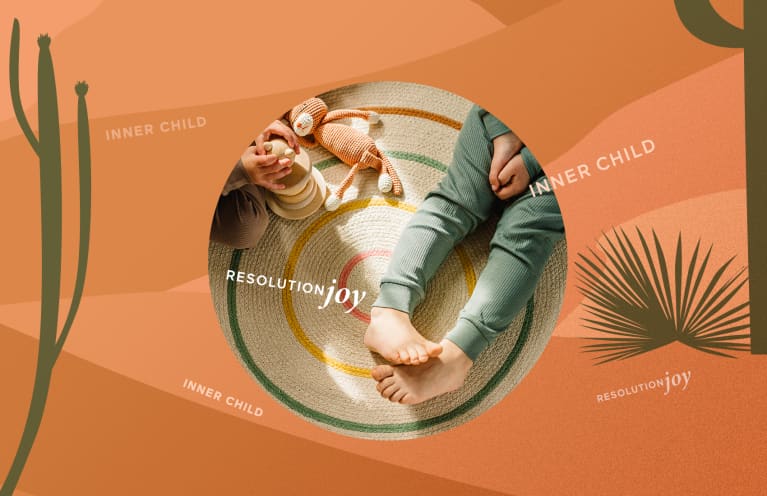The seriousness of life works to build a structure of bricks and concrete, highways and techno pathways within you. How we move through our inner buildings can be reflected by the serious roles we have in our outside life. When we have time we should take a look at the blueprints of our interior world and want to start 'allowing' green space or parks or nature walks to form.
When we Choose to soften the often harsh interior stage sets from which we project our experience out onto the outer experience, then we can plant more fun and wonder, and awe. If we let it, the kind of spontaneity that children have, can splash out playfully into our exterior worlds....and we can learn to play again. Michaela.
https://www.mindbodygreen.com/articles/how-to-play-like-kid-for-sake-of-your-mental-health
We Think 2021 Should Be The Year We All Play Like Kids Again & This Psychologist Agrees
Being an adult in 2020 was rough. It's no wonder that early on in the pandemic, households worldwide returned to childhood pastimes. Lego sales skyrocketed, pet adoptions soared, and by November, there was a global shortage of jigsaw puzzles. Beyond providing a brief escape from reality, these playful activities reminded us that it was, in fact, possible to feel joy again—even from 6 feet away.
After talking with family psychologist Nicole Beurkens, Ph.D., CNS, we're convinced that this return to childlike play is one trend that should be piggybacked into the new year.
Stress relief goes elemental: What kids can teach us about joy and play.
Unencumbered by the burdens of adulthood, Beurkens explains that kids are actually really good at finding joy wherever they go. "Kids don't have the responsibilities of adults, so they gravitate toward using their time in ways that bring pleasure and meet their needs," she says. Without all the to-do's, distractions, and demands for their time, young children also tend to be more mindful of their surroundings. "They notice the small things they experience in life and delight in them," Beurkens adds.
Oftentimes, kids will use play and movement to help them process and regulate their emotions. That's a skill that adults could most definitely benefit from—especially during such emotionally demanding times.
"Play, although it may look different for adults, gives the mind freedom to explore and work through uncomfortable feelings and experiences and can also serve as a beneficial distraction," says Beurkens. "As adults, one of the best ways for us to reduce stress is to slow down and be more mindful—taking in the things that bring us joy in the smallest of ways throughout our day."
How to connect to your inner child and find more joy this year.
Consider this your excuse to build that fort, get on that sled, or whip up your favorite childhood snack—you know, the one covered in rainbow sprinkles.
"Strategies for self-care, reconnecting to our inner child, and intentionally bringing joy into our lives is more important than ever before," says Beurkens. "Carve out some time in your schedule on a regular basis, even if it's 15 minutes, to engage in an activity that you loved as a kid or haven't done in a while." If it gets your body moving or flexes your mental muscles, all the better.
Here are some ideas for how to play like a kid this year, whether or not you have children of your own:
- Challenge a friend to a snowball fight.
- Paint a picture, or make a craft.
- Bust out that adult coloring book from 2015.
- Swing or play on the playground.
- Climb (or just hug) a tree.
- Go sledding.
- Build a snowperson.
- Play dress-up.
- Dance to a favorite song.
- Read a cherished comic book or children's book.
- Build something with Legos or blocks.
- Take a bubble bath.
- Do a cartwheel or another gymnastics move (but maybe have a spotter for this one).
- Build a fort.
- Play hopscotch or another active game.
- Relearn a musical instrument.
In addition to dabbling in these kid-approved activities, Beurkens says that these three habits can connect you to your inner child and help ease stress along the way:
1. Laugh more often, even if it's forced at first.
"Research shows that the act of laughing causes us to feel genuinely more joyful and relaxed. Kids laugh a lot, so laugh with them or on your own...even if you don't feel like it initially," she recommends. Like hitting 10,000 steps or eating a few servings of veggies, try to make laughing something you strive to do every day to stay healthy.
2. Notice the little things.
For a quick return to childhood mindfulness, Beurkens says to take a walk around your home and take it in as a kid might. "What do you see, hear, smell, and feel?, she asks. "Which of those things brings you joy?" This is also a great exercise to try outdoors.
3. Move your body regularly.
"You don't need to do an in-depth exercise program each day to get the stress-relieving benefits of movement," says Beurkens. "Take a cue from children and just get up and move, especially when you're feeling more stressed out, down, or angry." When the blues hit, she recommends dancing to an upbeat song or taking a walk around the block, but movement of any kind can flood the brain with happy hormones.
These days, the world is heavy enough. These tips remind us that our well-being routine is one thing that doesn't need to be so serious. And with that, I'll meet you at the swingset later; last one there is the rotten egg.


No comments:
Post a Comment
Note: only a member of this blog may post a comment.